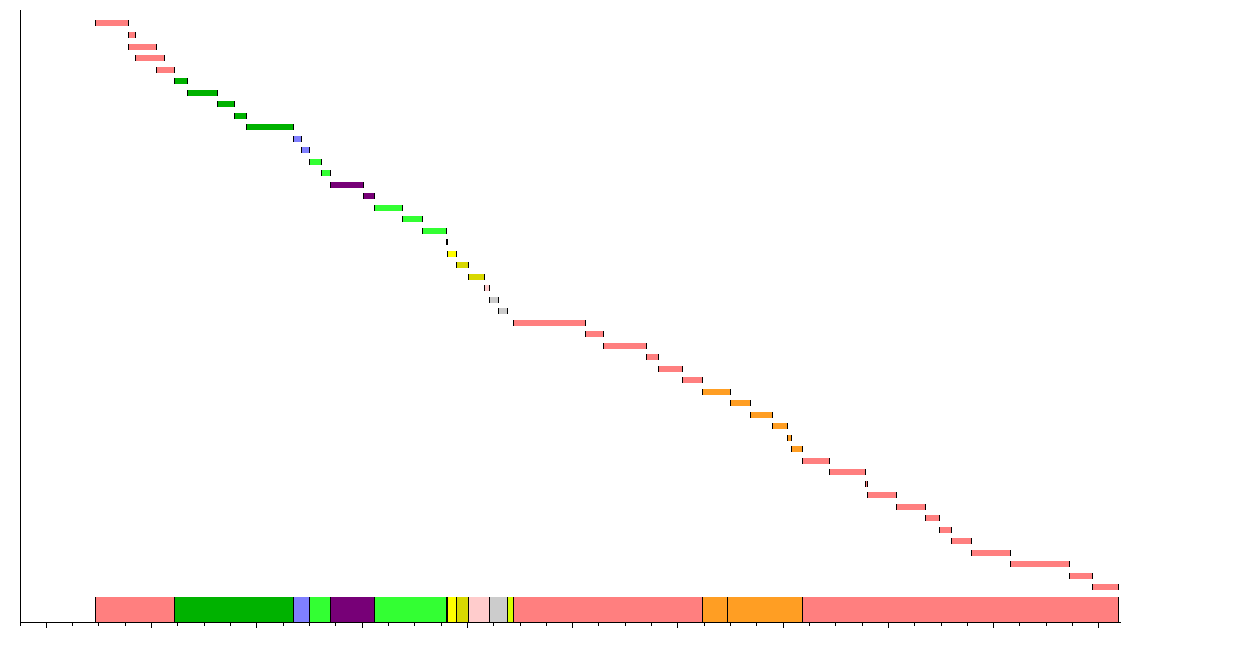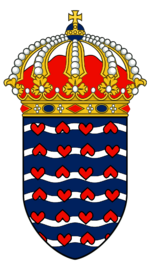List of Emerstarian monarchs: Difference between revisions
| Line 58: | Line 58: | ||
|align="center"|1047<br>–<br>1078 | |align="center"|1047<br>–<br>1078 | ||
|align="center"|[[Anneke van Wekehaart]] (three children) | |align="center"|[[Anneke van Wekehaart]] (three children) | ||
| rowspan="5" align="center"|<small> | | rowspan="5" align="center"|<small>Konungr allra Emerskar<br>''King of the Emerstarians''</small> | ||
|align="center"|[[File:Eirikr Segersælla Coat of Arms.png|125x125px]] | |align="center"|[[File:Eirikr Segersælla Coat of Arms.png|125x125px]] | ||
|- | |- | ||
| Line 98: | Line 98: | ||
|- | |- | ||
|} | |} | ||
===House of Sigfredsson (1122-1235)=== | ===House of Sigfredsson (1122-1235)=== | ||
[[Harald I of Emerstari|Harald I]] succeeded to the to throne as the maternal grandson of [[Jakob I of Emerstari|Jakob I]]. His father, [[Sigfred the Hound]], for whom the House of Sigfredsson is named, had been a trusted commander of the Eirikrian kings, and his grandfather had been one of the earliest supporters of [[Erik the Victorious]]. Harald, an avid bear-hunter (for that, he earned his epiteth), severely injured himself in a hunting incident in 1134, and he abdicated for his son [[Erik II of Emerstari|Erik II]]. Erik II's great-grandson, [[Karl II of Emerstari|Karl II]] had only a daughter, so the throne passed to the third son of Karl's sister, Isabel Håkonsdottir who had married [[Peter von Wassen, Count of Wassen]]. | [[Harald I of Emerstari|Harald I]] succeeded to the to throne as the maternal grandson of [[Jakob I of Emerstari|Jakob I]]. His father, [[Sigfred the Hound]], for whom the House of Sigfredsson is named, had been a trusted commander of the Eirikrian kings, and his grandfather had been one of the earliest supporters of [[Erik the Victorious]]. Harald, an avid bear-hunter (for that, he earned his epiteth), severely injured himself in a hunting incident in 1134, and he abdicated for his son [[Erik II of Emerstari|Erik II]]. Erik II's great-grandson, [[Karl II of Emerstari|Karl II]] had only a daughter, so the throne passed to the third son of Karl's sister, Isabel Håkonsdottir who had married [[Peter von Wassen, Count of Wassen]]. | ||
Revision as of 23:06, 25 May 2020
This article or section is in the process of an expansion or major restructuring. You are welcome to assist in its construction by editing it as well. If this article or section has not been edited in several days, please remove this template. If you are the editor who added this template and you are actively editing, please be sure to replace this template with {{in use}} during the active editing session. Click on the link for template parameters to use.
This article was last edited by Emerstari (talk | contribs) 4 years ago. (Update timer) |
| King of Emerstari | |
|---|---|
| Kuing Emerige | |
| Incumbent | |
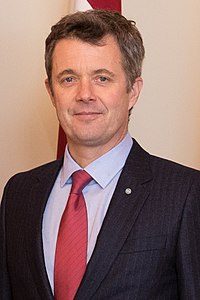 | |
| Erik XII Georg since 7 July 1994 | |
| Details | |
| Style | His Majesty |
| Heir apparent | Frederik Johann Eirikr |
| First monarch | Erik the Victorious |
| Formation | 1047 |
Part of a series on the |
|---|
| History of Emerstari |
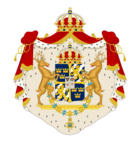 |
| Timeline |
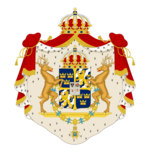 |
|
HM The King HM The King Father HM The King Mother HM The King Grandmother |
The monarch of Emerstari is the head of state, government, church in Emerstari. The first King of Emerstari (Emerstarian: Kuing Emerige), or as it was earlier styled King of the Emerstarians (Emerstarian: Kuing dem Emersker) was Erik the Victorious who united the nine Emerstarian petty kingdoms in the mid-eleventh century. Later chroniclers, particularly during the first Eirikrian Restoration, authored histories of the Emerstarian monarchy based on Emerstarian folklore tracing Erik the Victorious's ancestry to Adam and Eve through Rodouf, a great-grandson of Noah through Japheth and Magog, who led the first migration to Emerstari.
List of monarchs of Emerstari
House of Eirikr (1047-1122)
The reign of Erik the Victorious begins the rule of House of Eirikr, which had been referred to earlier as the House of Kveldur after a semi-legendary ancestor of Erik; the House of Eirikr, by its own right and through its cadet branches, would continue and still continues to dominant Emerstarian politics. Erik I died in 1078, and his two eldest sons Jakob I and Olaf I agreed to rule as diarchs as before his death, Erik had requested his friend, the Bishop of Uppsalle Bjivorr Eylirsson, to excommunicate his sons if they commit kinslaying or split the Kingdom via civil war. Jakob's eldest son, Jakob II took vows of chastity (possibly to hide the fact he was infertile). Therefore when he died, the kingship was again a monarchy through Olaf's line, but Olaf's son, Karl I died in 1122 with only an infant son, so the nobility used an Emerstarian form of tanistry known as slektentilsogening to select a new king.
| Portrait | Modern Name and Epithet |
Contemporary name and Epithet |
Lifespan | Relation to Predecessors | Reign | Consort(s) | Title | Arms |
|---|---|---|---|---|---|---|---|---|

|
Erik I the Victorious der Segerfuld |
Eirikr Ingemjårsson Segersælla |
1 August 1009 – 21 July 1078 (68) |
title created | 1047 – 1078 |
Anneke van Wekehaart (three children) | Konungr allra Emerskar King of the Emerstarians |

|

|
Jakob I the Southerner der Sydmann |
Jakobr Eiriksson Suðurmann |
14 November 1046 – 23 April 1085 (38) |
Son of Erik I | 1078 – 1085 |
Ragnhilde Leffsdottir (five children) | 
| |

|
Olaf I the Northerner der Nordmann |
Olaf Kounengsson Norðurmann |
29 January 1049 – 14 March 1105 (56) |
Son of Erik I | 1078 – 1105 |
Adelaide d'Anjeu (four children) | 
| |

|
Jakob II the Chastite der Kysker |
Jakob Jakobssen Kuska |
6 April 1070 – 2 September 1112 (42) |
Son of Jakob I |
1085 – 1112 |
- | 
| |

|
Karl I the Older der Aldre |
Karl Olufsson Eldri |
27 May 1089 – 6 November 1122 (33) |
Son of Olaf I | 1112 – 1122 |
Asa Swyensdottir (one child) | 
|
House of Sigfredsson (1122-1235)
Harald I succeeded to the to throne as the maternal grandson of Jakob I. His father, Sigfred the Hound, for whom the House of Sigfredsson is named, had been a trusted commander of the Eirikrian kings, and his grandfather had been one of the earliest supporters of Erik the Victorious. Harald, an avid bear-hunter (for that, he earned his epiteth), severely injured himself in a hunting incident in 1134, and he abdicated for his son Erik II. Erik II's great-grandson, Karl II had only a daughter, so the throne passed to the third son of Karl's sister, Isabel Håkonsdottir who had married Peter von Wassen, Count of Wassen.
| Portrait | Modern Name and Epithet |
Contemporary name and Epithet |
Lifespan | Relation to Predecessors | Reign | Consort(s) | Title | Arms |
|---|---|---|---|---|---|---|---|---|

|
Harald I the Bear-Hearted der Bjornhjartedt |
Harald Sigfredsson Berhartatha |
4 February 1100 – 23 December 1140 (40) |
Grandson of Jakob I | 1122 – 1134 |
Gunnhilde Magnusdottir (two children) | Koungengr a dem Emerska King of the Emerstarians |

|

|
Erik II the Second der Tvadter |
Eirik Haraldsson Annaða |
5 April 1116 – 18 April 1163 (44) |
Son of Harald I |
1134 – 1163 |
Ingeborga Gormsdottir (one child) | 
| |
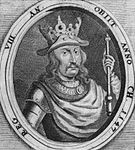
|
Erik III the Short der Skjort |
Eirik Eiriksson Skyrtta |
2 February 1146 – 23 December 1179 (32) |
Son of Erik II | 1163 – 1179 |
Borghilde Ulvsdottir (two children) | Kounge af dem Emerska King of the Emerstarians |

|

|
Håkon I the Clean der Ren |
Håkon Eiriksson Hreinna |
30 July 1162 – 5 October 1190 (28) |
Son of Erik III | 1179 – 1190 |
Margaret Sweynsdottir (six children) | 
| |

|
Karl II the Younger der Ungre |
Karl Håkonsson Yngra |
2 March 1184 – 23 May 1235 (41) |
Son of Håkon I |
1179 – 1235 |
Margaret Sweynsdottir (six children) | 
|
House of Wassen (1235-1250)
With the death of Karl II, the throne passed through his sister's grandson, the third son of Peter von Wassen, Count of Wassen, Wilhelm von Wassen who ruled as Villem I. The rule of the House of Wassen, though relatively short, opened Emerstari open to the rest of Scania through marriages with Rhenish and Polsnian families. Villem's son, Olaf II died without issue, and the nobility gathered in council selected Gustaf, Earl of Malmø, a member of the House of Malmø, a cadet branch of the House of Eirikr to be King.
| Portrait | Modern Name and Epithet |
Contemporary name and Epithet |
Lifespan | Relation to Predecessors | Reign | Consort(s) | Title | Arms |
|---|---|---|---|---|---|---|---|---|

|
Villem I the Rhenish der Hrenlander |
Villem Persson Hranmann |
2 January 1200 – 5 December 1242 (41) |
Grandnephew of Karl II | 1235 – 1242 |
(1) Adelheida Eiriksdottir (two children) (2) Heide von Horsten (one child) |
Kounge af dem Emerska King of the Emerstarians |

|

|
Olaf II the Tall der Langt |
Olaf Villemsson Hara |
18 April 1218 – 1 December 1250 (32) |
Son of Villem | 1242 – 1250 |
Alicja Jadrowąż (no issue) | 
|
House of Malmø (1250-1270)
Gustaf, Earl of Malmø ascended to the throne in 1242 via election. He was the first Emerstarian king to adopt a regnal name to rule with beside his own; this was mainly to show reverence to Erik I as the House of Malmø was a cadet branch of the House of Eirikr through a bastard great-grandson of Karl I. Gustaf I died in 1261, and his son and successor Erik IV Jakob died in 1270 with only daughters. His brother was seen as too weak to be King, so his nephew, seen as too young at the moment, made a gentlemen's agreement with the nobility at the Council at Ragnvaldsholm that they would elect his maternal uncle, Canute Heinrich von Wesse, Count Palatine of Wesse King, then upon his death, they would elect him.
| Portrait | Modern Name and Epithet |
Contemporary name and Epithet |
Lifespan | Relation to Predecessors | Reign | Consort(s) | Title | Arms |
|---|---|---|---|---|---|---|---|---|

|
Gustaf I Erik the Gold-Haired der Gylhjardt |
Gustaf I Erik Gulharda |
21 March 1208 – 17 November 1261 (52) |
Fourth great-grandson of Karl II | 1250 – 1261 |
Auguste von Heichel–Leffenburg (four children) | Kounge af dem Emerska King of the Emerstarians |

|

|
Erik IV Jakob the Well-Crowned der Valkrondt |
Erik I Jakob Valkoronda |
5 September 1230 – 6 April 1270 (39) |
Fourth great-grandson of Karl II | 1261 – 1270 |
Rikissa Johanna Månfredsdattir (two children) | 
|
House of Wesse (1270-1312)
Canute Heinrich von Wesse, Count Palatine of Wesse ascended to the throne in 1270 as a result of the gentlemen's agreement between his nephew and the nobility of Emerstari, ruling as Knudt I Henrik. Against it, though, he began to consolidate power in an attempt to secure the throne for his son; ultimately, when he died in 1303, his son Lokke Knudtsson had surrendered his claim to the Emerstarian throne to Knudt's brother, so he could rule as the Elector of Heischten in Rhenland. Folke I Villem, Knudt's brother, died in 1312 without issue.
| Portrait | Modern Name and Epithet |
Contemporary name and Epithet |
Lifespan | Relation to Predecessors | Reign | Consort(s) | Title | Arms |
|---|---|---|---|---|---|---|---|---|

|
Knudt I Henrik the Foreigner der Udtmann |
Knut I Henrik Utlandingmann |
16 July 1241 – 2 June 1303 (61) |
Brother-in-law of Erik IV Jakob | 1270 – 1301 |
Sofia Helvig Eriksdattir (two children) | Kounge af dem Emerska King of the Emerstarians |

|

|
Folke I Villem the Usurper der Tilriver |
Folke I Villem Hrifmann |
11 August 1251 – 1 February 1312 (61) |
Brother of Knudt I Henrik | 1301 – 1312 |
Katerin Martha Haraldsdattir (two children) | 
|
House of Malmø First Restoration (1312-1370) and House of Eek (1338-1350)
Upon the death of his other maternal uncle Folke I Villem, Ervin Klasson, Duke of Malmø, supported by the King of Coelans, called upon the nobility which he had convened with and their descendants to execute the agreement they had made with him fifty-two years prior in 1270 with threat of war. Thereafter, he was crowned at the advanced age of 68, and he ruled for nearly fourteen years. His long life was attributed to divine right, that, for his right to rule had been denied for so long, God blessed him with the longest life of any Emerstarian king to that point. Ervin I Knudt's son Olaf III Kristoffer succeeded him in 1338, ruling with his mother, Elsa I Annikke as co-monarchs for twelve years until her death in 1350. The term diarch is not used here by historians as Elsa was more of a sovereign adviser to Olaf than a sovereign ruler with him. Regardless, she is the first woman to be a Queen-regnant of Emerstari. In 1358, Olaf sent his daughter, Johanna Olafsdattir, to Marseile to wed the son of Charles VII of Marseile, the heir apparant, but en route she died due to the outbreak of the Coughing Plague, the Great Mortality. Upon, Olaf's death in 1370, Charles declared war, proclaiming himself as the King of the Emerstarians by right of his son's "sabotaged" marriage to Johanna.
| Portrait | Modern Name and Epithet |
Contemporary name and Epithet |
Lifespan | Relation to Predecessors | Reign | Consort(s) | Title | Arms |
|---|---|---|---|---|---|---|---|---|

|
Ervin I Knudt the Old der Ald |
Eruin I Knud Elda |
1 February 1254 – 17 May 1338 (83) |
Grandnephew of Erik IV Jakob | 1312 – 1338 |
Elsa I Annikke (three children) | Kounge af dem Emerska King of the Emerstarians |

|

|
Elsa I Annikke the King's Mother der Kuingsmoder |
Elsa I Annikke Koungesmodir |
28 April 1270 – 16 September 1350 (80) |
Wife of Ervin I Knudt | 1338 – 1350 |
Ervin I Knudt (three children) | Drottning af dem Emerska Queen of the Emerstarians |

|

|
Olaf III Kristoffer the Bearded der Skagdt |
Olaf III Kristoffer Skagga |
30 December 1303 – 19 November 1380 (76) |
Son of Ervin I Knudt | 1338 – 1380 |
Solveig Annikke van Weitvelt (three children) | Kounge af dem Emerska King of the Emerstarians |

|
House of Potois (1380-1381)
Emerstari fell to the armies of Charles VII and III, but after one year, in an attempt to stabilize and legitimize his rule, he met with the nobility of Emerstari in Arhus where it was agreed that Emerstarians would recognize his brother-in-law as King as opposed to him.
| Portrait | Modern Name and Epithet |
Contemporary name and Epithet |
Lifespan | Relation to Predecessors | Reign | Consort(s) | Title | Arms |
|---|---|---|---|---|---|---|---|---|
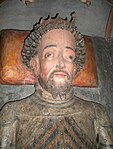
|
Karl VII and III the Wine-Drinker der Vindrikkere |
Karl VII and III Vindrykker |
7 March 1328 – August 31 1381 (62) |
Brother-in-law to Olaf III Kristoffer | 1312 – 1338 |
Eléonore Blanche de Jacquesse (one child) | Roi de Marseille King of Marseille Roi de l'Emersterrians King of the Emerstarians |

|
House of Jacquesse (1381-1390)
Pers, Duke of Jacuqesse, Charles VII and III's brother-in-law, reigned over Emerstari for nine years until the Emerstarian nobility fianally rebelled in the Olafsson War, which the two sons of Olaf III Kristoffer led.
| Portrait | Modern Name and Epithet |
Contemporary name and Epithet |
Lifespan | Relation to Predecessors | Reign | Consort(s) | Title | Arms |
|---|---|---|---|---|---|---|---|---|

|
Per IV and I the Marseilian King der Marskkuing |
Peder IV and I Marskakounge |
27 June 1330 – 14 November 1402 (71) |
Brother-in-law to Charles VII and III | 1381 – 1390 |
Emma von Schende (five children) | Dux de Jacquesse Duke of Jacquesse Roi de l'Emersterrians King of the Emerstarians |

|
House of Malmø Second Restoration (1390-1401)
After the Olafsson War, the elder son of Olaf III Kristoffer handed the throne over to his son who would rule as Sigismund I Kristoffer. Sigismund died in 1401, leaving the throne to his only son, Erik Sigismundssen. However, Erik was serving as a mercenary in Polsnia at the time, so his mother crowned herself Queen-regnant of Emerstari, becoming the first woman to rule as the sole monarch of Emerstari.
| Portrait | Modern Name and Epithet |
Contemporary name and Epithet |
Lifespan | Relation to Predecessors | Reign | Consort(s) | Title | Arms |
|---|---|---|---|---|---|---|---|---|

|
Sigismund I Kristoffer the Freer King der Frierekuing |
Sigismund I Kristoffer Fringerkounge |
4 October 1362 – 14 November 1401 (38) |
Grandson of Olaf III Kristoffer | 1301 – 1401 |
Erika I Henriette (one child) | Kounge af dem Emerskar King of the Emerstarians |

|
House of Sverrer (1390-1421)
The reign of Erika I Henriette was met with general discontentment from much of the nobility mainly due to the fact that she was a woman, so her brother, Harald Karlsson, Duke of Marland, convinced the nobility in council to crown him King alongside Erika, at least until Erik returns. Erik returned in 1404, however, by this time, the cadet branch of the House of Eirikr, the House of Malmø had lost favor amongst the nobility for his mother and uncle's cadet branch of the House of Eirikr, House of Sverrer, descended through a younger son of Jakob I, Donner Kuingsson, Earl of Marland.
| Portrait | Modern Name and Epithet |
Contemporary name and Epithet |
Lifespan | Relation to Predecessors | Reign | Consort(s) | Title | Arms |
|---|---|---|---|---|---|---|---|---|

|
Erika I Henriette the Sister-Consort der Sostergemål |
Eirika I Henriette Sostirgeimål |
13 April 1370 – 21 Speptember 1416 (46) |
Wife of Sigismund I Kristoffer | 1401 – 1416 |
Sigismund I Kristoffer (one child) | Drottning af dem Emerskar Queen of the Emerstarians |

|

|
Harald II Håkon the Strong der Sterk |
Harald II Håkon Sterka |
1 October 1369 – 9 August 1421 (51) |
Brother of Erika I Henriette | 1402 – 1421 |
Helvig Sigfriedsdattir (one child) | Kuinge af dem Emerskar King of the Emerstarians |

|
House of Aldburg (1421-1438)
While Erik Sigismundssen was never made King, his daughter married Wilhelm Ernst von Aldburg, Prince-Elector of Aldburg, and as Harald II Håkon only had a daughter, who married into the Leijonhuvudian Dukes of Whentii, the nobility in council reckoned a Rhenish elector a better choice. The reign of Wihelm Ernst, who ruled as Villem II Karl, was marked by his promiscuity; he had two wives bearing him eight children, and numerous mistresses bearing him an unknown amount of illegitimate children. He died in 1430 and was succeeded by his son, Kristien I Ulrik, who is suspected in modern-day to have been emotionally underdeveloped due to his upbringing. His reign was marked by instability and intrigue. Kristien I Ulrik died as a result of an isolated outbreak of the Coughing Plague, but his son was only twelve at the time, so Emerstari fell into a succession war.
| Portrait | Modern Name and Epithet |
Contemporary name and Epithet |
Lifespan | Relation to Predecessors | Reign | Consort(s) | Title | Arms |
|---|---|---|---|---|---|---|---|---|

|
Villem II Karl the Bastardmaker der Affsygsomfødseldtlaver |
Villelm II Karl Affsugsomfydseltlavar |
9 May 1370 – 29 September 1430 (60) |
Grandson-in-law of Olaf III Kristoffer | 1421 – 1430 |
(1) Margaret Jeanne de Potois (five children) (2) Isabella von Schlaudlin (three children) |
Kurfürst von Aldburgen Prince-Elector of Aldburg Kounge af dem Emerskar King of the Emerstarians |

|

|
Kristien I Ulrik the Unready der Onrede |
Kristejen I Ulrik Unreda |
24 November 1398 – 17 July 1438 (39) |
Son of Villem II Karl | 1430 – 1438 |
Martha von Schlaudlin (two children) | 
|
House of Eirikr First Restoration (1444-1570)
The House of Eirikr reemerged in the aftermath of the War of the Emerstarian Succession with Georg I Erik, a direct descendant of Erik the Victorious as the first King of this restoration. During his reign, he reformed the Emerstarian government and military, adopted Lutheranism and created the Church of Emerstari, and sent explorers to find Paradise, the North Pole, Template:Prester John, and riches in general, leading way for the Emerstarian Empire; all of this earned several epithets such as "the Great", "the Preacher-King", and "the Reformer". Because of all of this accomplishments, the reigns of his immediate descendants are not as distinguished in history, but this restoration of the Eirikrs saw another Queen-regnant, albeit her husband was crowned as King-regent as well.
| Portrait | Modern Name and Epithet |
Contemporary name and Epithet |
Lifespan | Relation to Predecessors | Reign | Consort(s) | Title | Arms |
|---|---|---|---|---|---|---|---|---|
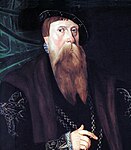
|
Georg I Erik the Great der Stor |
Georg I Erik dejr Stor |
7 August 1426 – 17 July 1512 (85) |
Eleventh great-grandson of Karl II | 1444 – 1512 |
Svea Frederikke Andersdatter (four children) | Koung Emerige King of Emerstari |

|

|
Erik V Georg the Quiet der Lugn |
Erik V Georg dejr Lugn |
3 December 1456 – 9 July 1529 (72) |
Son of Georg I Erik | 1512 – 1529 |
Theresa Johanna Elise von Saexe–Wesse (one child) | 
| |

|
Elsa II Nathalie the Pious der From |
Elsa II Nathalie dara From |
1 August 1483 – 7 November 1570 (87) |
Son of Georg I Erik | 1529 – 1570 |
Ernest Wilhelm Friedrich von Wolnbach, Prince-Elector of Rhenland (three children) | Drottning Emerige Queen of Emerstari |

|
House of Eirikr–Wolnbach (1570-1623)
As a woman, Elsa II Nathalie's children were of the House of her husband, the House of Wolnbach. Her eldest son Gustaf II Jakob, however, ceded his claims to his father's Rhenish lands to his younger brother and founded the House of Eirikr–Wolnbach. The House of Eirikr–Wolnbach ruled until 1623 when the it ran out of immediate male relatives, and the throne passed to the House of Eirikr–Wolnbach–Leijonhuvud.
| Portrait | Modern Name and Epithet |
Contemporary name and Epithet |
Lifespan | Relation to Predecessors | Reign | Consort(s) | Title | Arms |
|---|---|---|---|---|---|---|---|---|

|
Gustaf II Jakob the Hunter der Jager |
Gustaf II Jakob dejr Jager |
8 July 1511 – 2 August 1582 (71) |
Son of Elsa II Nathalie | 1570 – 1582 |
Mathilde Wilhelmina van Ziest (five children) | Koung Emerige King of Emerstari |

|
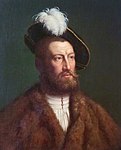
|
Gustaf III Folke the Bold der Djerve |
Gustaf III Folke dejr Djerve |
19 April 1530 – 9 February 1604 (73) |
Son of Gustaf II Jakob | 1582 – 1604 |
(1) Joan d'Oullise (two children) (2) Sofia Isabel Persdottir (one child) |

| |

|
Katarina I Solveig the Listener der Hyrrer |
Katarina I Solveig dara Hyrrer |
28 February 1552 – 17 October 1623 (71) |
Daughter of Gustaf III Folke | 1582 – 1623 |
Karl Rudolf Maudbourg (one child) | Drottning Emerige Queen of Emerstari |

|
House of Eirikr–Wolnbach–Leijonhuvud (1623-1704)
After the death of Katarina I Solveig, the throne passed to the her passed brother's son, Ervin Per, Earl of Undersalle, who came to identify more with his mother's House of Leijonhuvud then his father's House of Eirikr–Wolnbach, thus creating the House of Eirikr–Wolnbach–Leijonhuvud. In the same year that Katarina died, so did the Soumeland, and Ervin was elected the King of Soumeland as well as King of Emerstari; the two crowns remained unified 1904. Ervin II Gustaf's great-grandson, perhaps the most famous member of the House of Leijonhuvud as a whole, Karl IV Lorens died in battle in 1704, and the throne passed to his maternal nephew of the House of Leijonhuvud–Pfach.
| Portrait | Modern Name and Epithet |
Contemporary name and Epithet |
Lifespan | Relation to Predecessors | Reign | Consort(s) | Title | Arms |
|---|---|---|---|---|---|---|---|---|

|
Ervin II Gustaf the Dual-King der Dubbelskkuing |
Ervin II Gustaf dejr Dubbelskkuing |
19 May 1576 – 22 November 1650 (74) |
Nephew of Katarina I Solveig | 1623 – 1650 |
Anna Fredericha von Zeihr (three children) | Kuing Emerige King of Emerstari Soumen Kunigas King of Soumeland |

|

|
Erik VI Georg the Simple der Enkel |
Erik VI Georg der Enkel |
2 June 1601 – 31 August 1669 (68) |
Son of Ervin II Gustaf | 1650 – 1669 |
Kjarlotte Amelie Persdatter (four children) | 
| |

|
Gustaf IV Jakob the Wig-Wearer der Pergbarar |
Gustaf IV Jakob der Pergbarar |
30 April 1630 – 6 December 1690 (60) |
Son of Erik VI Georg | 1669 – 1690 |
Freja Ingvara Karlsdatterr (two children) | Kuing Emerige King of Emerstari ...more |

|

|
Karl IV Lorens the Great der Stor |
Karl IV Loren der Stor |
30 April 1672 – 2 June 1704 (32) |
Son of Gustaf II Jakob | 1690 – 1704 |
Amelie van Hoefft (no issue) | 
| |

|
Annette I Maria the Black-Haired der Svarthjardt |
Annette I Maria der Svarthjardt |
15 June 1673 – 19 July 1740 (67) |
Son of Gustaf II Jakob | 1704 – 1708 |
Wilhelm Adolf III, Landgrave of Schefft (two children) | 
|
House of Leijonhuvud–Pfach (1704-1718)
Karl IV Lorens died in battle in 1704, leaving the throne to his sister as Queen and her husband as King-regent until their son, Ervin III Karl was of age. Ervin III Karl was the only monarch of the House of Leijonhuvud–Pfach, being assassinated in 1718, having only begot a daughter. The Emerstarian kingship returned once again to the House of Eirikr.
| Portrait | Modern Name and Epithet |
Contemporary name and Epithet |
Lifespan | Relation to Predecessors | Reign | Consort(s) | Title | Arms |
|---|---|---|---|---|---|---|---|---|
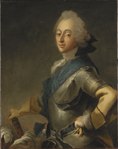
|
Ervin III Karl the Young der Ung |
Ervin III Karl der Ung |
12 September 1692 – 20 October 1718 (26) |
Son of Annette I Maria | 1704 – 1718 |
Anaïs Magali de Donat (one child) | Kuing EmerigeKuing Emerige King of Emerstari ...more |

|
House of Eirikr Second Restoration (1718-present)
Upon the extinction of the male line of the House of Leijonhuvud–Pfach, the nobility of Emerstari in council selectde one amongst them to be King, the Duke of Flodland of the House of Eirikr, Erik Lorens Eirikr. He ruled as the eighth Erik despite being only the seventh in honor of his grandfather who he had been very close to. His reign was marked by diplomacy over war, mainly through the marriages of his eighteen children into the other Scanian monarchies; he, moreover, commissioned the creation of a new Emerstarian constitution, albeit the constitution was ratified under the reign of his son. Under this restoration of the House of Eirikr, the Emerstarian Empire reached both its height and its decline.
| Portrait | Modern Name and Epithet |
Contemporary name and Epithet |
Lifespan | Relation to Predecessors | Reign | Consort(s) | Title | Arms |
|---|---|---|---|---|---|---|---|---|

|
Erik VIII Olaf the Diplomat der Diplomatist |
Erik VIII Olaf der Diplomatist |
10 July 1679 – 9 July 1744 (64) |
Ninth great-grandson of Georg I Erik | 1728 – 1744 |
Elsa Frederikke Leijonhuvud (eighteen children) | Kuing Emerige King of Emerstari ...more |

|

|
Erik IX Johann the Just der Lagfuld |
Erik IX Johann der Lagfuld |
16 March 1720 – 10 November 1778 (58) |
Son of Erik VIII Olaf | 1744 – 1788 |
Kjarlotte Ingvera Ekkelof (six children) | 
| |
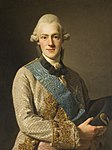
|
Olaf III Aleksender the King's Uncle der Kuingsfarsbroder |
Olaf III Aleksender der Kuingsfarsbroder |
29 May 1723 – 5 October 1800 (77) |
Son of Erik VIII Olaf | 1788 – 1780 |
Else Johanna Leijonhuvud (five children) | 
| |
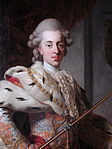
|
Karl V Erik the Well-Dressed der Valkladt |
Olaf III Aleksender der Kuingsfarsbroder |
1 September 1749 – 19 March 1808 (58) |
Son of Erik IX Johann | 1780 – 1808 |
Isabel von Freid (two children) | 
| |

|
Ervin IV Thomes the Friendly der Vanlig |
Ervin IV Thomes der Vanlig |
12 May 1769 – 7 March 1835 (55) |
Son of Karl V Erik | 1808 – 1835 |
Sofie Erika Strand (five children) | 
| |

|
Folke II Knudt the Friendly der Vanlig |
Ervin IV Thomes der Vanlig |
6 July 1790 – 11 June 1847 (56) |
Son of Ervin IV Thomes | 1835 – 1847 |
Karolin Georgia Fjellborg (three children) | 
| |

|
Gustaf IV Johann the True der Tro |
Gustaf IV Johann der Tro |
21 June 1810 – 12 May 1872 (61) |
Son of Folke II Knudt | 1847 – 1872 |
Elisabet Kjarlotte Fjellborg (one children) | 
| |

|
Kristien II Gustaf the Good der Godt |
Kristien II Gustaf der Godt |
22 August 1812 – 1 August 1879 (66) |
Son of Folke II Knudt | 1872 – 1879 |
Louise de Rieumont (four children) | 
| |

|
Elsa III Marie the Mother der Moder |
Elsa III Marie der Moder |
9 October 1862 – 30 December 1941 (79) |
Daughter of Kristien II Gustaf | 1879 – 1916 |
Hasse Johann Folkberg–Eirikr, Earl of Folkberg (two children) | Drottning Emerige Queen of Emerstari ...more |

|

|
Erik X Gustaf the Long-Liver der Langtlivere |
Erik X Gustaf der Langtlivere |
18 August 1900 – 17 February 2019 (118) |
Son of Elsa III Marie | 1916 – 1972 |
Nathalie Jakoba Leijonhuvud (three children) | Kuing Emerige King of Emerstari ...more |

|

|
Erik XI Deitrik the Long-Heir der Langtarving |
Erik XI Deitrik der Langtarving |
2 September 1933 – 6 March 2026 (92) |
Son of Erik X Gustaf | 1972 – 1994 |
Synnøva Margaret Leijonhuvud (two children) | 
| |
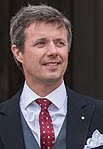
|
Erik XII Georg the Peaceful der Fridfuld |
Erik XII Georg der Fridfuld |
4 August 1970 – present (66) |
Son of Erik XI Deitrik | 1994 – present |
Else Marie Ljundmark (three children) | 
|
King-regents of Emerstari
Although the Emerstarian throne may be inherited by women, traditionally and even today constitutionally, their husbands must be crowned alongside them to provide a patriarch and father to the Emerstarian people as King-regents, a position that is in theory lesser the Queen-regnent but is in practice, just as if not more powerful. This power dynamic combine with the want to preserve their dynasty and bloodlines drove the Eirikr family to arrange Elsa III Marie's marriage to her third cousin twice removed, Hasse Johann Folkberg–Eirikr, Earl of Folkberg.
| Portrait | Modern Name and Epithet |
Contemporary name and Epithet |
Lifespan | Reign | Queen | House | Arms |
|---|---|---|---|---|---|---|---|

|
Ernst Frederik Volnbåker the Rich der Rik |
Ernst Frederik Volnbåker dejr Rik |
3 October 1476 – 29 January 1543 (66) |
1529 – 1543 |
Elsa II Nathalie | House of Wolnbach | 
|

|
Frederik Ågust Volnbåker the Well-Wed der Valgiftedt |
Frederik Ågust Volnbåker dejr Valgiftedt |
12 March 1513 – 18 September 1571 (58) |
1543 – 1570 |
Elsa II Nathalie | House of Wolnbach | 
|

|
Karl Rudolf Mudborg the Regal der Kuinglig |
Karl Rudolf Mudborg der Kuinglig |
17 June 1549 – 11 April 1615 (65) |
1582 – 1615 |
Katarina I Solveig | House of Maudbourg | 
|

|
Ervin Per Leijonhuvud the Earl der Jarl |
Ervin Per Leijonhuvud der Jarl |
19 May 1576 – 22 November 1650 (74) |
1615 – 1623 |
Katarina I Solveig | Eirikr–Wolnbach–Leijonhuvud | 
|

|
Villem Adulf Fåk the Rhenlander der Hrenskemann |
Villem Adulf Fåk der Hrenskemann |
29 May 1669 – 1 December 1737 (68) |
1704 – 1708 |
Annette I Maria | House of Pfach | 
|

|
Hasse Johann Folkberg–Eirikr the Eirikr der Eirikr |
Hasse Johann Folkberg–Eirikr der Eirikr |
10 July 1854 – 3 August 1932 (78) |
1879 – 1916 |
Elsa III Marie | House of Eirikr | 
|
Timeline of Emerstarian monarchs
